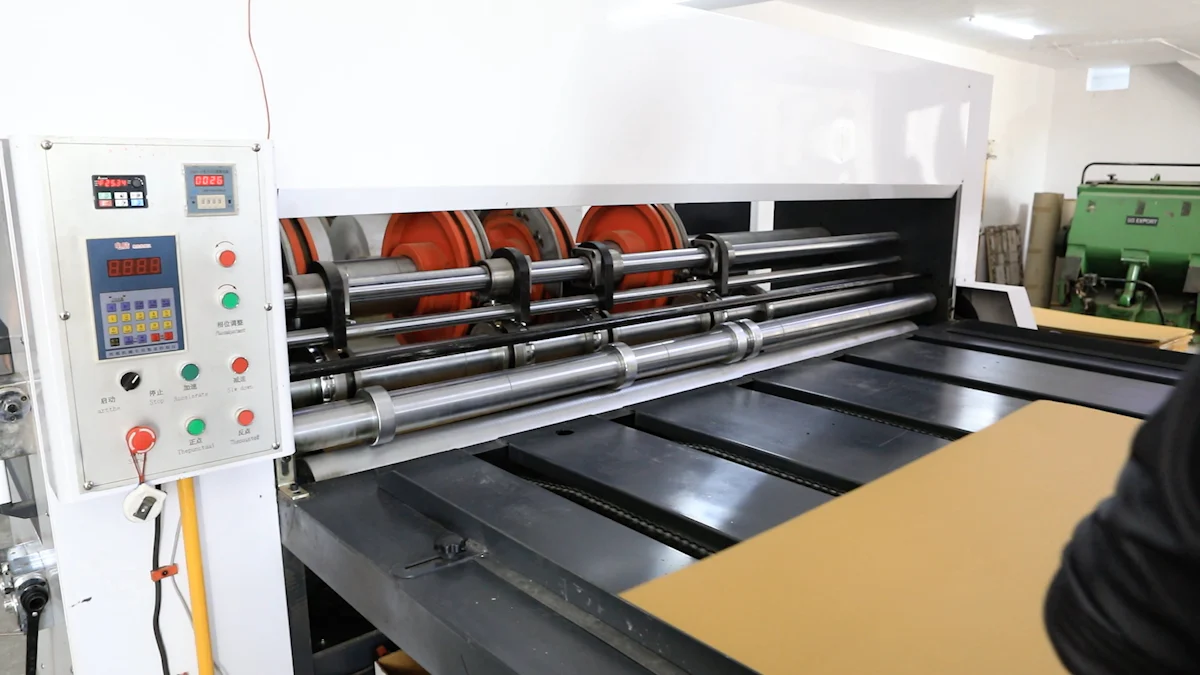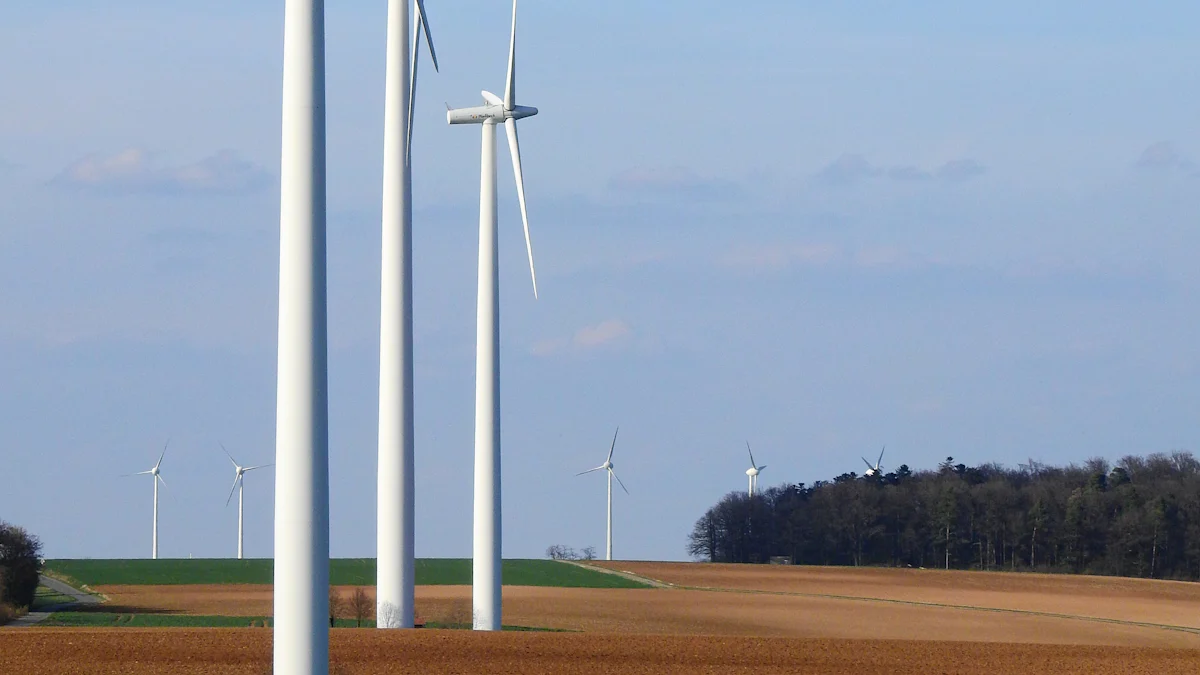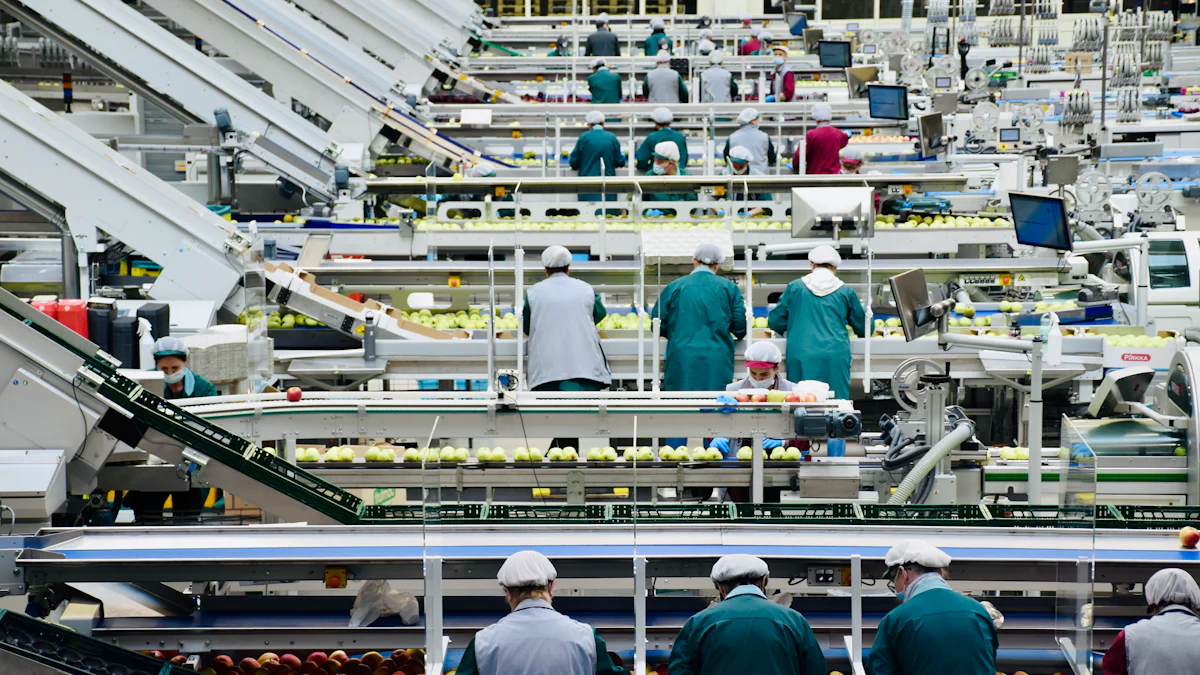
News

You encounter frequency inverters in many systems that rely on electric motors. These devices adjust motor speed and torque, ensuring optimal performance. By integrating a Frequency Inverter, you can achieve significant energy savings—up to 30%—through precise speed control. This not only reduces power consumption but also minimizes noise and extends equipment lifespan. Advanced models, like the Vector Frequency Inverter, offer enhanced digital monitoring and control, making them ideal for modern applications. Additionally, economic VFD solutions provide cost-effective options for industries aiming to improve efficiency without compromising performance.
Key Takeaways
Frequency inverters can save up to 30% in energy costs by optimizing motor speed and torque, leading to significant operational savings.
In HVAC systems, frequency inverters enhance comfort by controlling airflow and temperature, while also reducing noise and extending equipment lifespan.
In manufacturing, these devices improve precision and efficiency, allowing for better product quality and reduced material waste through optimized motor control.
Frequency inverters are crucial in renewable energy systems, maximizing energy production from wind and solar sources by adjusting to varying conditions.
Electric vehicles benefit from frequency inverters by achieving smooth acceleration, extending range, and supporting regenerative braking for improved energy efficiency.
Their modular design simplifies installation and maintenance, making frequency inverters a versatile choice for various applications, from industrial machinery to public transit systems.
By integrating frequency inverters, industries can enhance sustainability efforts, reduce operational costs, and contribute to a greener future.
Applications of Frequency Inverters in HVAC Systems

Image Source: pexels
Ventilation and Airflow Control
You can use frequency inverters to optimize ventilation systems by controlling the speed of fans. This allows you to adjust airflow based on the specific needs of a building or facility. For example, in large commercial spaces, these devices ensure that air circulation matches occupancy levels, reducing unnecessary energy consumption. By maintaining precise control over fan speeds, frequency inverters also help minimize noise, creating a more comfortable environment for occupants.
Modern frequency inverters offer advanced features like digital monitoring and seamless integration into building management systems. These capabilities allow you to analyze performance data and make real-time adjustments. This not only improves energy efficiency but also extends the lifespan of your equipment. Additionally, the ability to operate fans at variable speeds ensures that the system runs at its optimal point, reducing wear and tear.
Heating and Cooling Systems
In heating and cooling systems, frequency inverters play a critical role in enhancing efficiency and performance. They regulate the speed of compressors, pumps, and other components, ensuring that the system meets the exact cooling or heating demand. For instance, when paired with compressors like the BITZER reciprocating compressor, frequency inverters adjust operations to match the current load. This reduces energy consumption and lowers operational costs.
By using frequency inverters, you can achieve precise temperature control in HVAC systems. This is particularly beneficial in environments where maintaining consistent temperatures is essential, such as data centers or hospitals. Furthermore, these devices reduce the strain on system components during startup by gradually increasing motor speed. This feature not only prevents sudden power surges but also enhances the reliability of the entire system.
Frequency inverters also support modular designs, making them easy to install and maintain. Their ability to provide a wide range of motor speeds without compromising torque ensures that your heating and cooling systems operate efficiently under varying conditions. With their energy-saving capabilities and low lifecycle costs, frequency inverters are indispensable for modern HVAC applications.
Applications of Frequency Inverters in Industrial Machinery
Manufacturing and Automation
In manufacturing and automation, frequency inverters play a vital role in ensuring precision and efficiency. You can use them to control the speed and torque of motors driving various machines, such as robotic arms, CNC machines, and assembly lines. By adjusting motor speeds to match specific tasks, frequency inverters help you achieve consistent product quality and reduce material waste.
These devices also enhance energy efficiency by optimizing power consumption based on the operational demand of the machinery. For example, when a machine operates at partial load, the frequency inverter reduces the motor's speed, saving energy and lowering operational costs. Additionally, they minimize mechanical stress on components by providing smooth acceleration and deceleration, which extends the lifespan of your equipment.
Modern frequency inverters often come with advanced features like programmable logic control (PLC) integration and real-time monitoring. These capabilities allow you to automate complex processes and make data-driven decisions to improve productivity. Whether you're running a small workshop or a large-scale factory, frequency inverters are indispensable for streamlining operations and maintaining competitiveness in today's industrial landscape.
Pumps, Compressors, and Conveyors
Frequency inverters are essential for optimizing the performance of pumps, compressors, and conveyors. You can use them to regulate motor speeds, ensuring that these systems operate at their most efficient point. For instance, in pumping applications, frequency inverters adjust the flow rate to match the required output, reducing energy consumption and preventing water hammer effects.
In compressors, frequency inverters help maintain consistent pressure levels by varying motor speeds based on demand. This not only improves energy efficiency but also reduces wear and tear on the system. Similarly, in conveyor systems, frequency inverters allow you to control the speed and direction of belts, enabling smooth material handling and preventing product damage.
Another significant advantage is noise reduction. By operating motors at optimal speeds, frequency inverters minimize noise generation, creating a safer and more comfortable working environment. Additionally, their ability to provide precise control over motor functions makes them ideal for applications requiring high accuracy, such as bottling lines or packaging systems.
With their versatility and energy-saving capabilities, frequency inverters are a valuable investment for any industrial setup. They not only enhance operational efficiency but also contribute to sustainable practices by reducing energy consumption and extending equipment life.
Applications of Frequency Inverters in Renewable Energy Systems

Wind Energy Systems
You can find frequency inverters playing a crucial role in wind energy systems. These devices regulate the speed of wind turbine generators, ensuring they operate efficiently under varying wind conditions. By adjusting the generator's speed to match the wind's velocity, frequency inverters help maximize energy production. This dynamic control allows you to harness more power even during low or fluctuating wind speeds.
Modern frequency inverters also contribute to grid stability. They synchronize the alternating current (AC) output of wind turbines with the grid's frequency and voltage. This ensures seamless integration of renewable energy into the power distribution network. Additionally, these inverters enhance the reliability of wind energy systems by providing real-time monitoring and fault detection. You can use this data to optimize performance and reduce downtime.
Another advantage lies in their modular design. This feature simplifies installation and maintenance, making it easier for you to scale up wind energy projects. With their ability to optimize energy production and support grid stability, frequency inverters are indispensable in advancing wind energy technology.
Solar Energy Systems
In solar energy systems, frequency inverters serve as the backbone for converting direct current (DC) generated by photovoltaic panels into usable AC electricity. These inverters dynamically adjust their operation to optimize energy production based on sunlight intensity. By doing so, they ensure that your solar panels deliver maximum efficiency throughout the day.
Frequency inverters also play a vital role in managing energy flow. They synchronize the AC output with the grid, allowing you to feed excess energy back into the system or store it in batteries for later use. This capability not only enhances energy efficiency but also supports grid services like voltage regulation and frequency stabilization.
Advanced solar inverters come equipped with digital monitoring features. These tools enable you to track energy production, consumption, and system performance in real time. By analyzing this data, you can make informed decisions to improve the efficiency of your solar setup. Additionally, frequency inverters protect your system from power surges and other electrical faults, ensuring long-term reliability.
With their ability to optimize energy production, manage power distribution, and enhance system safety, frequency inverters are essential for modern solar energy applications. They empower you to achieve sustainable energy goals while reducing operational costs.
Applications of Frequency Inverters in Transportation
Electric Vehicles
You rely on frequency inverters to enhance the performance and efficiency of electric vehicles (EVs). These devices control the speed and torque of electric motors, ensuring smooth acceleration and deceleration. By adjusting motor speed based on driving conditions, frequency inverters help you achieve optimal energy usage, extending the range of your EV.
Modern frequency inverters also improve the driving experience. They provide precise control over motor functions, allowing for seamless transitions between different speed levels. This ensures a quieter and more comfortable ride. Additionally, these inverters reduce mechanical stress on components, increasing the lifespan of your vehicle's motor and drivetrain.
Another key advantage lies in their ability to support regenerative braking systems. When you apply the brakes, the inverter captures the kinetic energy and converts it into electrical energy, which recharges the battery. This feature not only enhances energy efficiency but also reduces wear on the braking system.
Frequency inverters also play a role in EV charging stations. They regulate the power flow during charging, ensuring safety and efficiency. With their ability to optimize motor performance and energy consumption, frequency inverters are indispensable in advancing EV technology.
Rail and Public Transit Systems
In rail and public transit systems, frequency inverters ensure efficient and reliable operation. They control the speed of electric motors in trains, trams, and subways, enabling smooth acceleration and deceleration. This precise control improves passenger comfort and reduces energy consumption.
You can also use frequency inverters to enhance the braking systems of rail vehicles. Similar to EVs, they support regenerative braking, converting kinetic energy into electrical energy. This energy can be reused within the system or fed back into the grid, contributing to overall energy savings.
Frequency inverters also reduce noise levels in public transit systems. By operating motors at optimal speeds, they minimize vibrations and mechanical stress, creating a quieter environment for passengers. Additionally, their modular design simplifies maintenance, ensuring minimal downtime for transit operations.
Modern frequency inverters offer advanced monitoring and control features. You can use these tools to analyze system performance and make real-time adjustments, improving operational efficiency. With their ability to optimize energy use and enhance reliability, frequency inverters are vital for sustainable and efficient public transportation.
Other Applications of Frequency Inverters
Medical Equipment and Avionics
You encounter frequency inverters in critical fields like medical equipment and avionics, where precision and reliability are paramount. In medical devices, these inverters regulate motor speeds in equipment such as MRI machines, ventilators, and surgical tools. By providing precise control, they ensure that these devices operate smoothly and deliver accurate results. For example, in ventilators, frequency inverters adjust airflow rates to match the specific needs of patients, enhancing their comfort and safety.
In avionics, frequency inverters play a vital role in managing electrical systems. They convert fixed frequencies into variable ones, enabling efficient operation of onboard systems like cooling fans, hydraulic pumps, and navigation equipment. Their compact design and high efficiency make them ideal for applications where space and weight are limited. Additionally, these inverters reduce noise generation, which is crucial in maintaining a quiet cabin environment for passengers.
Modern frequency inverters also offer advanced monitoring features. You can use these tools to track performance metrics and detect potential issues early, ensuring uninterrupted operation. Their ability to provide steplessly adjustable speed ranges enhances system efficiency and extends the lifespan of critical components. With their versatility and reliability, frequency inverters are indispensable in advancing medical and aviation technologies.
Off-Grid and Backup Power Systems
Frequency inverters are essential in off-grid and backup power systems, especially in areas with unstable or no access to the main power grid. In off-grid setups, they convert direct current (DC) from solar panels or batteries into alternating current (AC) to power household appliances and industrial equipment. High-frequency inverters are particularly effective for lighter loads, offering greater efficiency and compact designs suitable for portable applications.
For heavy loads and extreme conditions, low-frequency inverters provide better performance. These inverters handle demanding tasks like running large motors or powering entire buildings during outages. Their robust design ensures reliable operation even under challenging circumstances. By using frequency inverters, you can achieve energy efficiency and reduce noise levels, making them ideal for both residential and commercial applications.
In backup power systems, frequency inverters ensure a seamless transition between the main power supply and the backup source. They regulate voltage and frequency, protecting sensitive equipment from power surges or fluctuations. Additionally, their modular design simplifies installation and maintenance, allowing you to scale your system as needed. Whether you're managing a small off-grid setup or a large backup system, frequency inverters provide the flexibility and reliability you need.
You can rely on frequency inverters to revolutionize modern industries with their versatile applications. These devices enhance energy efficiency, reduce operational costs, and provide precise control over systems. Their ability to optimize power consumption and streamline processes makes them indispensable in HVAC, industrial machinery, renewable energy, transportation, and more. With advancements in technology, frequency inverters will continue to drive innovation, improve sustainability, and simplify operations. By integrating these solutions, you not only achieve better performance but also contribute to a greener and more efficient future.
FAQ
What is a frequency inverter?
A frequency inverter is a device that controls the speed of an AC motor by adjusting the frequency and voltage of the power supplied to it. You can use it to regulate motor speeds in various industrial applications, ensuring optimal performance and energy efficiency. It allows you to seamlessly change motor speeds from zero to the desired level, making it essential for systems requiring precise control.
Where are frequency inverters commonly used?
You will find frequency inverters in applications like ventilation systems, industrial machinery, compressors, pumps, and transport equipment. They are also widely used in HVAC systems, renewable energy setups, and electric vehicles. These devices help reduce energy consumption, minimize noise, and extend the lifespan of equipment.
How do frequency inverters improve energy efficiency?
Frequency inverters optimize motor speed based on the specific operational demand. By running motors only at the required speed, they prevent unnecessary energy usage. For example, in a pump system, the inverter adjusts the flow rate to match the output needed, significantly reducing power consumption.
Can frequency inverters reduce noise levels?
Yes, frequency inverters can help reduce noise. By operating motors at optimal speeds, they minimize vibrations and mechanical stress, which lowers noise generation. This makes them ideal for environments where maintaining a quiet atmosphere is important, such as hospitals or office buildings.
Are frequency inverters easy to install and maintain?
Modern frequency inverters feature modular designs, making them straightforward to install and maintain. You can easily integrate them into existing systems, and their advanced monitoring capabilities allow you to detect issues early, ensuring smooth operation and minimal downtime.
What are the benefits of using frequency inverters in HVAC systems?
In HVAC systems, frequency inverters regulate the speed of fans, compressors, and pumps. This ensures precise temperature and airflow control, reduces energy consumption, and extends the lifespan of system components. They also help create a more comfortable environment by minimizing noise and maintaining consistent performance.
How do frequency inverters support renewable energy systems?
Frequency inverters play a critical role in renewable energy systems like wind and solar power. In wind turbines, they adjust generator speeds to maximize energy production under varying wind conditions. In solar systems, they convert DC electricity from panels into AC power for grid use, ensuring efficient energy management.
Can frequency inverters enhance the performance of electric vehicles?
Yes, frequency inverters are vital for electric vehicles. They control motor speed and torque, ensuring smooth acceleration and deceleration. They also support regenerative braking, which converts kinetic energy into electrical energy to recharge the battery, improving overall energy efficiency and extending the vehicle's range.
Are frequency inverters suitable for off-grid power systems?
Frequency inverters are highly effective in off-grid power systems. They convert DC power from solar panels or batteries into AC power for household or industrial use. High-frequency inverters are ideal for lighter loads, while low-frequency inverters handle heavy-duty tasks, ensuring reliable performance in diverse conditions.
How do frequency inverters contribute to cost savings?
By optimizing motor speeds and reducing energy consumption, frequency inverters lower operational costs. They also minimize wear and tear on equipment, reducing maintenance expenses. Over time, these savings make frequency inverters a cost-effective solution for various applications.
Please give us a message